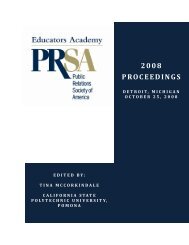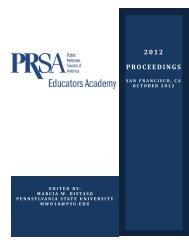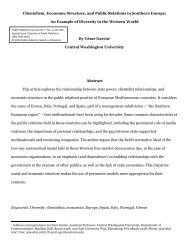2010 - Public Relations Society of America
2010 - Public Relations Society of America
2010 - Public Relations Society of America
You also want an ePaper? Increase the reach of your titles
YUMPU automatically turns print PDFs into web optimized ePapers that Google loves.
tools. By comparing and contrasting the behaviors <strong>of</strong> all generations, future studies could help<br />
answer this compelling question.<br />
This particular study looked intently on channel usage related to indentifying social<br />
media use and the way that this relates to brand loyalty and continued interest in continuing<br />
relationships. What it doesn’t look at is message content that is disseminated through those<br />
channels. Additional research should be conducted in order to analyze messages that are sent<br />
through these social media channels and how those messages relate to Millennials wanting to<br />
continue their relationship with the organization.<br />
Finally, while this study allowed the researcher to investigate Millennials’ interaction<br />
with social media tools <strong>of</strong> specific companies, research is also needed to investigate what makes<br />
Millennials engage with one particular social media tool over another. The current study found<br />
that Millennials heavily engage with social networking sites (e.g., MySpace and Facebook).<br />
What makes Millennials engage with social networking sites more than other social media tools<br />
such as blogs, micro-blogs, or podcasts? To extend the current study, a future qualitative study<br />
could divulge a better understanding through open-ended questions as to why Millennials prefer<br />
social networking sites and e-mail to microblogging and podcasts. Likewise, researchers might<br />
also examine the various social media tools that Millennial engage with the most and how those<br />
tools change over time.<br />
Conclusion<br />
Beneficial relationships with the public are important for the survival <strong>of</strong> an organization.<br />
<strong>Public</strong> relations practitioners must build and maintain strong relationships between the<br />
organization and its public to lead to a desired behavior <strong>of</strong> the public for the organization and<br />
vice-versa. Rather than focusing on all dimensions <strong>of</strong> the organization-public relationship<br />
(anthropomorphic, personal commitment, pr<strong>of</strong>essional benefit/expectation, community<br />
improvement, and comparison <strong>of</strong> alternatives), this study specifically concentrated on the<br />
personal commitment relationship to the company/brand. Hence, the current study contributes to<br />
a theoretical body <strong>of</strong> knowledge in the public relations field by providing acute in-depth<br />
understanding into the personal commitment relationship dimension, specifically with a younger<br />
demographic, the Millennial Generation.<br />
In addition, this study is important to the field <strong>of</strong> public relations because <strong>of</strong> its<br />
contribution to the body <strong>of</strong> literature focusing on social media tools and contribution to the<br />
knowledge <strong>of</strong> public relations practitioners. The literature review for this study sufficiently<br />
exemplifies the growth <strong>of</strong> social media within the field. The current study enhances that body <strong>of</strong><br />
literature by supporting other’s testimonies (Gillin, 2007; Hallahan, 2008; Li and Bern<strong>of</strong>f, 2008;<br />
Scott, 2007) <strong>of</strong> the importance <strong>of</strong> a social media presence for organizations to build relationships<br />
with key publics. Currently, the literature supports organizations being familiar with and using<br />
many social media tools, but current findings indicate that organizations that utilize one tool well<br />
is more essential than using several social media tools. As this study showed, Millennial<br />
satisfaction does not increase with the variety <strong>of</strong> tools, yet for most companies/brands a social<br />
media presence did matter with Millennials’ favorable perceptions <strong>of</strong> that particular<br />
company/brand.<br />
<strong>Public</strong> relations practitioners are yearning for in-depth knowledge <strong>of</strong> social media tools<br />
and how they can best play into their relationship building with key markets. In October, the<br />
cover <strong>of</strong> PRWeek, a monthly magazine targeted to practitioners, read Social Media Survey 2009.<br />
The seven-page article by Maul (2009) outlined important issues in social media such as what<br />
was being used most frequently industry-wide (social networking) to ethical issues <strong>of</strong> using<br />
20
















